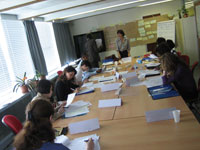Science Education

- © UNESCO/P. Chiang-Joo
Capacity in science and technology is a key element in economic and social development. Promoting science education at all educational levels and scientific literacy in society in general is a fundamental building block to building a country’s capacity in science and technology. Science education has been a priority for UNESCO since its inception.
Science, technology, engineering and mathematics education (STEM) is important for developing and developed countries alike, to increase public awareness, understanding and literacy regarding science, engineering and technology, and also to enable developing countries to build up a critical mass of scientists, researchers and engineers to enable them to participate fully in the global economy. Particular emphasis is given to encouraging young people and especially young girls to pursue careers in science.
Science education is a key element in all UNESCO science, education and communication programmes. The programmes work together through the Intersectoral Platform on Science Education which has highlighted the need for more innovative methods for science teaching to encourage interest in science and engineering.
Programmes which contribute to the Intersectoral Platform include:
- International Basic Sciences Programme (IBSP) promotes science education in mathematics, physics and chemistry as part of its mandate to foster international cooperation for capacity building in science
- UNESCO’s Global Microscience Programme makes available teaching and learning packages as basic practical resource for science experiments
- UNESCO’s Space Education Programme promotes space subjects and disciplines in schools and universities through workshops and promotes the integration of these subjects in the science curricula especially in developing countries
- The International Year of Astronomy 2009 jointly being implemented by UNESCO and the International Astronomical Union is fostering outreach activities worldwide to promote interest in and understanding of the importance of astronomy and the basic sciences in daily like
- UNESCO promotes science education for women
- UNESCO promotes scientific literacy through its activities in the field of science journalism and facilitating access to media content on scientific subjects in developing countries
- UNESCO encourages the design of effective science and technology education programmes by promoting gender-sensitive, socio-culturally and environmentally relevant policies and curricula.
- UNESCO’s Teacher Training Initiative in Sub-Saharan Africa (TTISSA) promotes the training of teachers including science teaching
- The Education Kit on Combating Desertification principally targets primary school teachers and their pupils, aged 10-12 years old, in desertification-affected countries
- The Natural Disaster Reduction programme promotes the integration and education of disaster risk reduction into school curricula in countries prone to natural hazards
- Biosphere Reserves: learning sites for sustainable development

